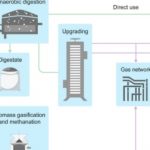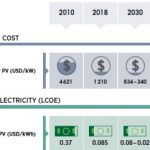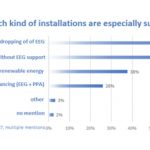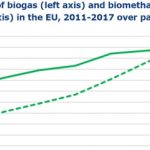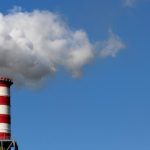The world needs a large supply of renewable carbon to replace fossil feedstocks for hard-to-abate sectors like aviation, shipping, chemicals, food and beverage. Arno van den Bos, Karan Kochhar, Luis Janeiro and Francisco Boshell at IRENA present the results of their study to estimate demand, and whether supply can match it through to 2050. The main sources of supply come from alcoholic fermentation, biogas, pulp & paper, and biomass. Each has … [Read more...]
Biogas from dairy farms: what incentives can make it commercially viable?
Anaerobic digesters are used to turn cow manure into useable methane fuel. But the raw cost of that gas is ten times the market price. On the plus side, emissions are being avoided. So how do you create the incentives that are fair and make it commercially viable? In California, dairy biogas has risen from almost non-existence five years ago to delivering half of all natural gas used for transportation in the state. Aaron Smith at the Energy … [Read more...]
‘Green Deal Industrial Plan’ explainer: 40%+ of the top low-carbon technologies must be made in the EU by 2030
The EC’s new series of proposed targets and reforms, contained in its Green Deal Industrial Plan, aim to ensure that at least 40% of the EU’s low-carbon technologies will be made within its borders by 2030. The eight “strategic net-zero technologies” are: Solar (power and thermal); Onshore and offshore wind; Batteries and energy storage; Heat pumps and geothermal; Electrolysers and fuel cells; Sustainable biogas/biomethane; CCS; Grid … [Read more...]
Europe must simultaneously replace Russia’s fossil exports and accelerate its clean energy deployment
The Ukraine crisis has had an immediate impact on Europe’s strategy for energy supply security. And this week’s sudden halting of gas supplies by Russia to Poland and Bulgaria only emphasises the urgency. Dolf Gielen, Ricardo Gorini, Luis Janeiro and Seán Collins at IRENA look at the best options, basing their findings on their latest “World Energy Transitions Outlook”, published in March, that lays out a routemap for the next eight years for … [Read more...]
Could nano-scale filters for isolating CO2, Hydrogen and Biogas accelerate the energy transition?
Nano-scale filters have been developed to separate out molecules like CO2 and hydrogen from gaseous streams. The research, led by MIT, could open a new door to raising the efficiency of carbon capture, isolating hydrogen for fuel use, and the purification of biogas fuel from waste. David Chandler at MIT explains how it would replace century-old methods of separating gaseous molecules that use energy-intensive and hard-to-electrify high … [Read more...]
Gas Crunch: time to factor in volatility and externalities to reveal its true costs
The current gas price shock (and any future ones) raises the question: if we had invested more in renewables, efficiency, buildings renovation, and green gases, would we be actually saving money instead of losing it? Looking at the EU, Dolf Gielen, Michael Taylor and Barbara Jinks at IRENA urge governments to do something they’ve not done before and factor in the negative impacts of volatile fossil fuel prices. Moreover, they should calculate the … [Read more...]
Buildings: France and Flanders lead on decarbonising new builds
Buildings are responsible for 36% of total EU carbon emissions. So, since the start of 2021 European legislation requires all new buildings to be ‘nearly zero energy’. The frontrunners are France and Flanders in Belgium, according to a new report from the Buildings Performance Institute Europe (BPIE), writes Clare Taylor. Both jurisdictions have plans for phasing out fossil fuels in new buildings within five years. Taylor explains how Flanders … [Read more...]
Biogas and Biomethane’s untapped potential across the world
The IEA’s World Energy Outlooks have no doubt that electrification alone cannot meet our climate goals. That’s why natural gas continues to play a major role. But biogas and biomethane have the potential to replace 20% of that gas, says the IEA’s special report “Outlook for biogas and biomethane: Prospects for organic growth”. At present only a fraction of that is being utilised. Here the IEA summarises their comprehensive report. Costs are the … [Read more...]
Biofuels “light-to-power” slump: because photosynthesis is no match for Solar PV
The success of energy crops depends on many things. But the first link in the chain is a weak one: natural photosynthesis, the conversion of light into energy by plants. The problem is the efficiency of photosynthesis is no match for that of a modern solar PV cell. And while solar technology keeps improving, mother nature – not a signatory to the Paris Agreement – has no plans to do so. Any progress must come from biotechnology which is slow … [Read more...]
Germany 2021: when fixed feed-in tariffs end, how will renewables fare?
Starting in 2021 many of Germany’s existing “pioneer” wind turbines, solar PV installations and biogas plants – launched with generous price guarantees - will stop receiving fixed feed-in tariffs. That means renewable capacity may be shut down if they can’t find a new business model to run on. The new rules comes at a decisive time for Germany’s energy transition as it tries to increase renewables to meet emissions targets and gradually increase … [Read more...]
Biogas and Biomethane in Europe: Denmark, Germany, Italy lead
Over and again, legislators worldwide are confronting the same question: which technologies do we subsidise and support, when, by how much, and for how long. Get it right and those costs will reduce and should disappear once scale is reached. Solar and wind are on their way to proving that. What about biofuels? Marc-Antoine Eyl-Mazzega and Carole Mathieu of the Institut Français des Relations Internationales (IFRI) look at the last 10 years. The … [Read more...]
Why decarbonising gas might be harder than you think
Decarbonising the European energy system by 2050 will require a fundamental shift for the way the gas industry operates, away from business-as-usual in network planning and market design. Achieving net-zero greenhouse gas emissions in Europe, in line with the Paris Agreement on Climate Change, leaves no room for fossil gas consumption where CO2 is not captured and stored. But turning the gas industry into a zero-carbon industry is no simple task. … [Read more...]
Everything you always wanted to know about Russian gas supplies to Europe
There are various ways for Europe to reduce its “dependence” on Russian gas, but they all have their drawbacks, concludes a new report from the Oxford Institute for Energy Studies (OIES). The report makes it clear that the Russian-EU gas relationship has many intricacies that policymakers should be aware of when they develop new gas policies. … [Read more...]









